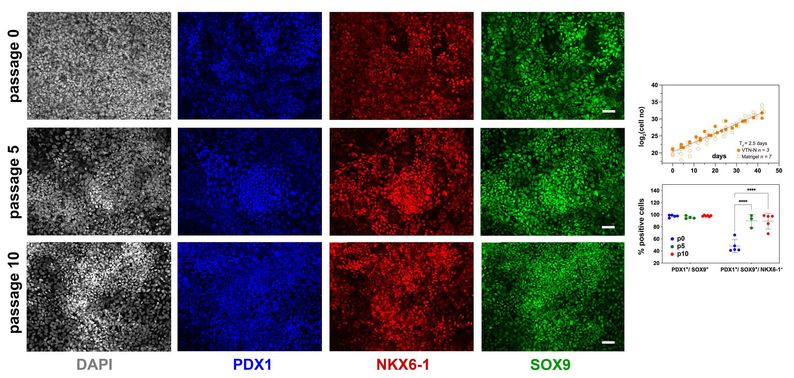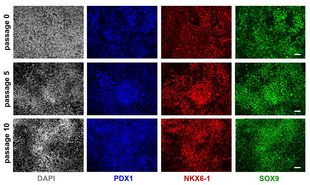Researchers at the DZD partner Paul Langerhans Institute Dresden have identified mechanisms that promote the expansion and differentiation of pancreatic progenitor cells (PP). In future, these mechanisms could support the unlimited expansion of human pluripotent stem (hPS) cell-derived PP cells. The results, published in “Elife”, set the stage for new ways of treating diabetes.
Nearly ten percent of the world's population has diabetes and, in severe cases, treatment requires whole pancreas transplantation or the transplantation of insulin-producing islet cells. However, the widespread application of this approach to treating diabetes is currently limited by a scarcity of organ donors. Furthermore, affected individuals require lifelong medications that suppress the immune system so that the body does not reject the transplanted organs. Therefore, scientists at the DZD are working on utilizing human pluripotent stem (hPS) cells for the generation of insulin-producing cells.
Chemically Optimized Expansion Medium Decouples PP Proliferation from Differentiation
The team led by Prof. Anthony Gavalas at the Paul Langerhans Institute Dresden has already made significant progress in the expansion of hPS cell-derived progenitors. According to their recently published results, the greatest challenge lay in maintaining the self-renewal of PP cells while simultaneously inhibiting their differentiation. The chemically optimized cell culture medium decouples the proliferation of PP cells from their differentiation and enables up to a 2000-fold expansion over 10 passages and 40–45 days, without impairing differentiation.

Representative images of immunofluorescent staining of p0 PP cells as well as C5-expanded cells at p5 and p10 for the PP transcription factors PDX1, NKX6.1, and SOX9. © PLID
A Highly Promising Outlook: The Method is Scalable
The method is versatile and scalable. The researchers have patented the procedure and entered into an agreement for commercial development.
This pioneering work marks an important milestone on the path to more effective diabetes treatments and demonstrates the potential of regenerative medicine.
Original publication:
Jarc L, Bandral M, Zanfrini E, Lesche M, Kufrin V, Sendra R, Pezzolla D, Giannios I, Khattak S, Neumann K, Ludwig B, Gavalas A. Regulation of multiple signaling pathways promotes the consistent expansion of human pancreatic progenitors in defined conditions. Elife. 2024 Jan 5;12:RP89962. doi: 10.7554/eLife.89962.

